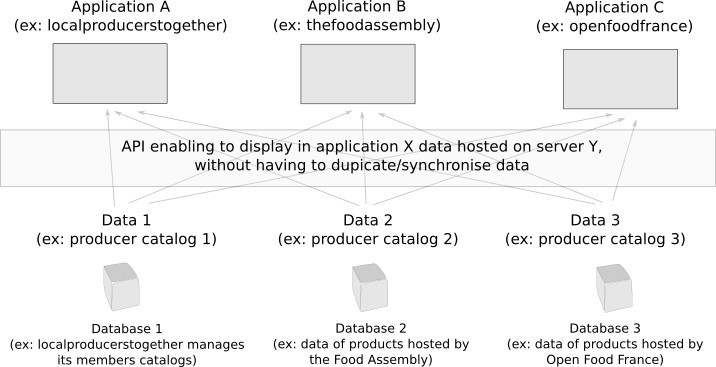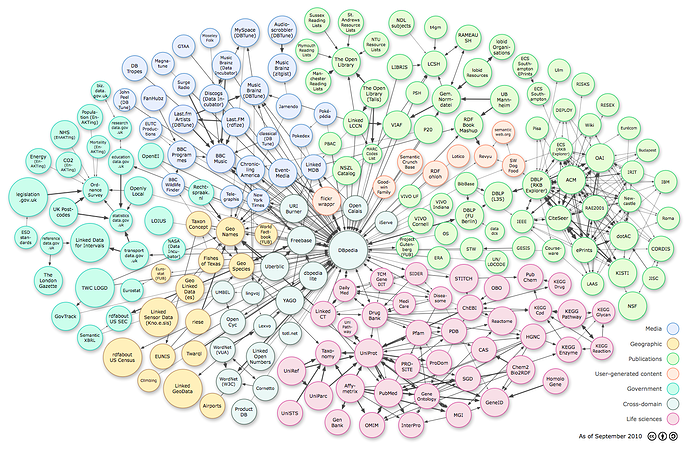… in order to build together an efficient and fluid decentralized food system
Connected to the discussion from Making OFN an open directory for all the local/sustainable food ecosystem
What’s the problem today?
1- If a producer manages his inventory in the food assembly, because he is already working with a food assembly, if he wants to start selling through a hub on the OFN he has to fill in again all his data. And each week he has to update his product catalog in each platform. He also needs to decide the stock he allocates to each platform.
2- Another problem I have faced trying to build a food hub in Paris: in my hub we wanted to buy vegetables from a group of producer, so display those vegetables in our OFN shop. BUT this groups of producer is already organized and uses a tool for their clients to order online their products. They have a very agile update process, they add products everyday, and as people order online, the stock evolves also dynamically. As a consequence, I couldn’t use the OFN as it was just not possible to synchronize the data on the producers platforms and on the OFN shop.
3- The biggest problem of food hubs is logistics. Most of the time every food hub organizes its own logistics on his side, with big economic and environmental cost (CO2 emission due to transport). Some studies shows that food hubs sometimes are worse than centralized food supply in terms of environmental impact because of that.
What can we do about it?
The strategy I am trying to implement is this one:
A producer can choose to manage its catalog and inventory in the OFN for example, and decide to open up its data to another platform if he wants to start working with a food hub using another platform. He remains the owner of his data and control them.
For example, in an OFN shop I could have products listed that comes from the OFN database and products that are “hosted” on the Food Assembly database. When an order is made, it impacts directly the stock level in the database of the Food Assembly.
So this means read/write authorizations.
How to get there
The first step is to sit around the table with the other food platforms who share that vision that we need to solve the problems above. And together, we need to agree on:
- standards about to describe products and transactions
- and taxonomies, and on that, the idea is to build an open source thesorus, linked data platform, that all food platforms can refer to when filling in products, etc.
Potential impact on mutualized logistics solutions
Now imagine that products are displayed in standardized way, we can know at any moment what are the products that needs to be moved, from where to where and when, and that for all platforms.
By using opendatastandards (with a democratic management of data and agreement of data owners of course) we could imagine mutualized logistics services that would be cheaper for everyone and environmentally friendly 
The Data Food Consortium project starting in France
I have shared that vision with different food platforms managers the last months and we are now together creating a consortium to move forward together on this project  Open Food France, The Food Assembly, Panier Local, Cagette.net and Ekylibre have joined the adventure already, and more will join! We start the prototype with the French platforms but definitely this might become some more international working group, maybe under the W3C patronage? Let’s see
Open Food France, The Food Assembly, Panier Local, Cagette.net and Ekylibre have joined the adventure already, and more will join! We start the prototype with the French platforms but definitely this might become some more international working group, maybe under the W3C patronage? Let’s see 
I’ll let you know about the next steps, we will try to raise funds and make a website in the coming weeks, to start with!
Ping @Kirsten @NickWeir @RohanM @pmackay @maikel for information and feedback 


 I prefer to start small with our local folks to find the first bit on how all that could work, but we know that this discussion needs to be held at an international level, probably under the W3C patronage, and I’m meeting next week with a global non-profit working on standardization.
I prefer to start small with our local folks to find the first bit on how all that could work, but we know that this discussion needs to be held at an international level, probably under the W3C patronage, and I’m meeting next week with a global non-profit working on standardization. … see you
… see you